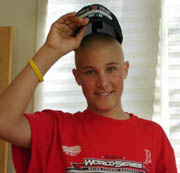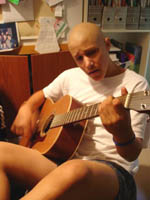| Maryland Newsline |
| Home Page |
Politics
|
Md. Congressman Says Bethesda Teen's Battle Illustrates Need for Legislation
Capital News Service Thursday, March 15, 2007 WASHINGTON - It started with a headache that wouldn't go away, but it wasn't until the third doctor's visit that Matthew Grossman learned that a germ cell tumor was growing in his brain. "It was hard to be able to even react to it," said Grossman, who was an eighth-grader at Charles E. Smith Jewish Day School in Rockville, Md., when he was diagnosed with the rare form of cancer. "Like when you lose a parent or a loved one, you realize it by degrees, over a long period of time." Grossman underwent almost six months of chemotherapy, radiation treatments, surgeries, two stem cell transplants and six weeks of radiation during his eighth and what would have been his ninth-grade year. He's now back on track in 10th grade. Grossman and other children with cancer are the reason that Rep. Chris Van Hollen Jr., D-Kensington, and other House members introduced the Conquer Childhood Cancer Act of 2007, a bill to fight childhood cancer by authorizing $30 million a year for five years for research expansion, creating a childhood cancer database, establishing research fellowships and providing support for families battling cancer. In a news conference on Capitol Hill to announce the initiative, Van Hollen said, "We must launch an all-out battle against pediatric cancers." About 12,400 Americans under 20 are diagnosed with cancer each year, according to the Children's Oncology Group, a pediatric cancer research organization. "Families that have lost a loved one to cancer can use the pain that they felt to channel to something positive ... so that other children have the help they need," Van Hollen said. The administration's current budget is inadequate and cuts funds for pediatric cancer and important research bodies such as the National Institutes of Health, said Van Hollen. "It's flat-lining the NIH," Van Hollen said of the administration's new budget, "real cuts that do not keep pace with medical inflation." Jaime Banks, Grossman's mother, came to the announcement to support other families fighting pediatric cancer. After the year of treatments and home-schooling, she said, Matthew's headaches were gone, and the cancer was beaten, but he faced a new problem: He began to lose his hearing. He felt like he experienced some blank moments of sound, but didn't realize the extent of things until he began playing his guitar in the hospital room.
Banks told her son that his playing sounded horrible or out of tune, and he denied it, but tried to re-tune the instrument anyway. "It was the first time I was unable to tune my guitar," Matthew said. Loss of hearing was the most difficult part of his experience with cancer, he said, because it made the fears and warnings that he kept putting in the back of his mind become real. He couldn't hear conversations at school, classes were harder, and he began to concentrate less, said Matthew. He went to a youth group, and could not hear much of what was going on. He cried on the way home. "People would just stop talking to me," Matthew said. "I realized that this isn't something I just have to get through [losing his hearing] -- this is something that will last forever." Doctors implanted a digital hearing aid, and his hearing is almost back to normal, but Matthew occasionally asks people to repeat themselves. Banks says that her son has become a stronger person, and she is thankful that he is now in a stable place. "The difference between kids and adults battling cancer is that kids want to get back to normal life," said Deidre Adkins, whose son, Paul, went through three surgeries, nine spinal taps and five rounds of chemotherapy during his eighth-grade year at Landon School in Bethesda before he was cured of Burkitt lymphoma. Burkitt is one of the most rapidly-growing forms of cancer. "Somehow they summon up a reserve of courage that, as adults, would never seem possible," said Banks of her son. "These kids develop these qualities of strength and ability to face what they face and just go through it." "Our kids' childhoods have been taken away from them -- stolen from them," she said. "My son's life will never be whole in many ways. ... It was a pain in the neck, but he was going to get his life back." Copyright © 2007 University of Maryland Philip Merrill College of Journalism
|


